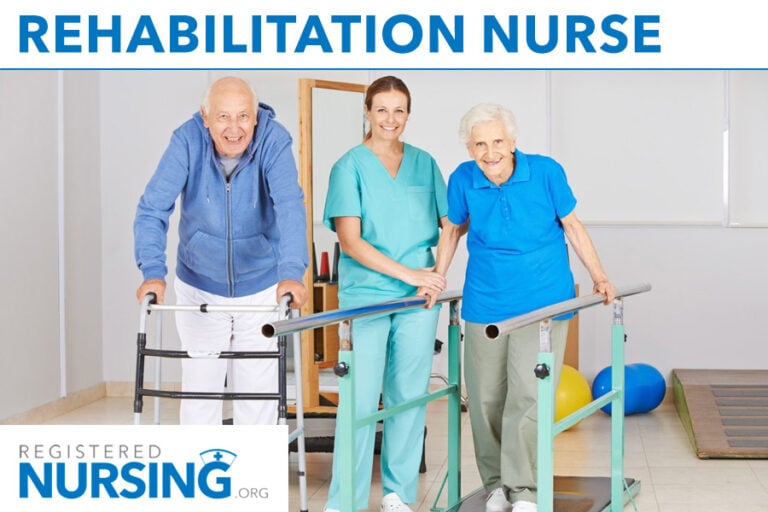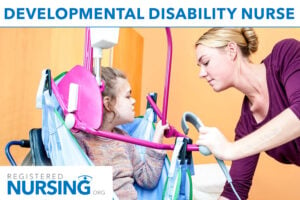Rehabilitation Nurse

What is a Rehabilitation Nurse?
Rehabilitation nurses help patients who have long-term physical disabilities or chronic illnesses and assist them with any personal limitations that might result from these disabilities. These nurses work with patients and families to create a tailored recovery plan. Rehabilitation nurses also help patients to set both long and short-term goals. As a rehabilitation nurse, your primary objective is to help your patients regain their health and independence to the best of their ability. Many rehabilitation nurses work with patients on an ongoing basis.
How to Become a Rehabilitation Nurse
Aside from the medical aspects, rehabilitation nurses must be supportive and encouraging, as the recovery process for many patients can be grueling and frustrating. They must gently guide their patients to push past their limits to reach goals. A positive attitude and an abundance of patience are excellent traits for this role. Being a rehabilitation nurse can be incredibly rewarding, and it is suited for those with a strong desire to help others and change lives.
What Are the Schooling Requirements for Rehabilitation Nurses?
Whether obtaining a BSN (Bachelor of Science in Nursing) or an ADN (Associate’s Degree in Nursing), earning a nursing degree is the first step toward becoming licensed as an RN and embarking on a career as a rehabilitation nurse. You can apply for the NCLEX-RN licensing examination upon earning a nursing degree. Once this exam is passed, you can apply for a registered nursing license via your state's nursing board. Additionally, continuing education courses are available that introduce RNs to basic rehabilitation nursing concepts.
While not a requirement, nurses who wish to enter advanced practice roles may wish to earn a Master’s of Science in Nursing (MSN) to become nurse practitioners (NPs) and clinical nurse specialists (CNSs). Currently, master's degrees specific to advanced practice rehabilitation nursing simply don't exist.
Registered nurses (RNs) can, however, pursue post-graduate degrees such as:
- Ph.D. in Rehabilitation Science
- Executive Masters in Rehabilitation Administration
- Master of Health Science (MHS) Degree in Rehabilitation Sciences
Are Any Certifications or Credentials Needed?
Rehabilitation nurses can increase their employment opportunities and compensation by earning the Certified Rehabilitation Registered Nurse (CRRN®) credential. This distinction requires passing an exam and having two years of experience in rehabilitation nursing. Rehabilitation nurses can obtain their CRRN credential through the Rehabilitation Nursing Certification Board (RNCB), an independent auxiliary component of the Association of Rehabilitation Nurses. Requirements to sit for the exam include having an unrestricted license as an RN and one to two years of practice as an RN in rehabilitation nursing within the five years before applying.
The CRRN credential is one certification that is popular amongst rehab nurses, but there are several others that you may be interested in:
| Certification | Length | Key Differences |
| Certified Rehabilitation Registered Nurse-Advanced (CRRN-A) | Valid for 5 years | Advanced certification for experienced rehabilitation nurses, emphasizing specialized knowledge and leadership in rehab nursing. Requires a master’s degree or higher in nursing. |
| Certified Case Manager (CCM) | Valid for 5 years | Broader certification covering case management across different healthcare settings, including rehabilitation. It includes knowledge of patient advocacy, legal and ethical standards, and interdisciplinary care. |
| Certified Registered Nurse in Rehabilitation Nursing (CNRN) | Valid for 5 years | Focuses on neurological rehabilitation nursing, dealing with patients who have experienced strokes, brain injuries, spinal cord injuries, and other neurological conditions. |
| Geriatric Rehabilitation Nurse Certification (GRN) | Valid for 5 years | Specialized certification for nurses focusing on the rehabilitation needs of elderly patients. It covers geriatric care, including managing chronic conditions and promoting mobility and independence. |
| Wound, Ostomy, and Continence Nursing Certification (WOCN) | Valid for 5 years | Certification for nurses specializing in wound care, ostomy, and continence issues, which are common in rehabilitation settings. Requires extensive training in wound management and patient education. |
| Certified Brain Injury Specialist (CBIS) | Valid for 5 years | Focuses on rehabilitation for patients with brain injuries. It emphasizes understanding brain injury symptoms, treatments, and the rehabilitation process for cognitive and physical recovery. |
What Does a Rehabilitation Nurse Do?
Rehabilitation nursing aims to assist individuals with a disability, injury, or chronic illness in regaining and/or maintaining maximum function. The rehabilitation staff nurse assists clients in adapting to an altered lifestyle while providing a therapeutic environment for clients and their families. They design and implement treatment strategies based on scientific nursing theory related to self-care that promotes physical, psychosocial, and spiritual health. The rehabilitation staff nurse works in inpatient and outpatient settings that can be found in a range of acute to sub-acute rehabilitation facilities. Common conditions that rehabilitation nurses help patients recover from and/or adapt to include:
- Strokes
- Traumatic brain injuries (TBI)
- Orthopedic injuries
- Amputations
- Cardiac conditions
- Spinal cord injuries
Where Do Rehabilitation Nurses Work?
Rehabilitation nurses practice their craft in a variety of settings, including:
- Outpatient rehabilitation centers
- Hospitals, clinics
- Long-term care agencies
- Patients' homes
- Home care agencies
- Assisted living facilities
Rehabilitation nurses can also work for educational institutions or insurance companies.
What Are the Roles and Duties of a Rehabilitation Nurse?
The primary objective of rehabilitation nursing is to assist patients in recovering and regaining independence and functionality following an injury, disability, or illness. A rehab nurse typically handles the following:
- Educates and assists patients to live with and appropriately manage chronic illnesses and injuries
- Assists patients in returning to their everyday lives following a severe illness or injury
- Prepares clients and their loved ones for future self-management and decision-making responsibilities by encouraging clients’ independence and ongoing goal achievement
- Teaches specific rehabilitation nursing techniques to help clients and their families develop the self-care skills necessary to move toward full rehabilitation
- Coordinates nursing activities in collaboration with additional members of the interdisciplinary rehabilitation team to facilitate the achievement of overall goals
- Acts as an educational and informational resource and role model for nursing staff, patients, and other clinical staff
- Performs hands-on nursing care by utilizing the nursing process to achieve quality outcomes for clients
- Shares pertinent information occurring in the disease processes underlying disabilities
Rehabilitation Nurse Salary & Employment
According to the United States Bureau of Labor Statistics, there are well over 2 million rehabilitation nursing and registered nursing positions nationwide. By 2032, this number is projected to grow by 7 percent—faster than average. The demand for rehabilitation nurses should be at least equal to this rate. Typically, rehabilitation nurses earn an average income of anywhere from $63,720 to $132,680 annually or approximately $86,070 on average.
| Average Annual Salary | |
| Lowest Earners | $63,720 |
| Lowest 25% of Earners | $75,990 |
| Median | $86,070 |
| Top 25% or Earners | $104,670 |
| Top Earners | $132,680 |
Helpful Organizations, Societies, and Agencies
- Association of Rehabilitation Nurses (ARN)
- American Academy of Physical Medicine and Rehabilitation (AAPM&R)
- The American Congress of Rehabilitation Medicine (ACRM)
- Canadian Association of Rehabilitation Nurses (CARN)








